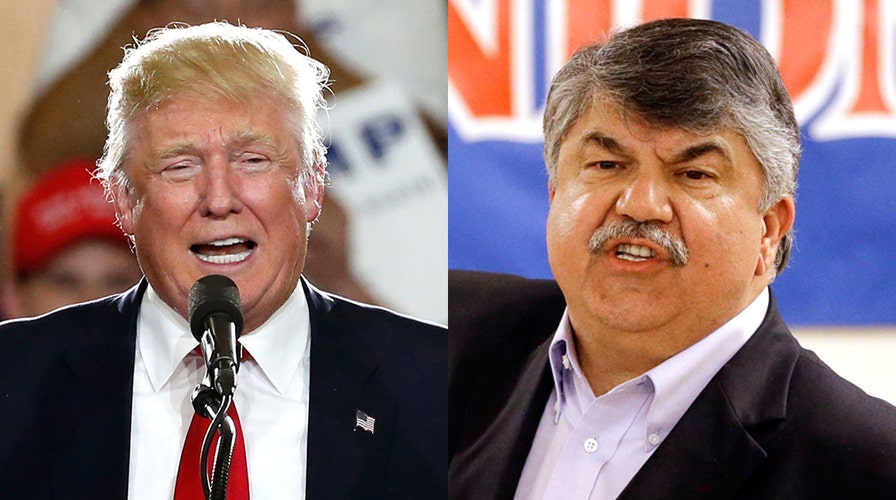Can Trump make inroads with union voters?
Strategy Room: Ellen Ratner and Scott Rasmussen discuss whether Trump can lure the labor vote away from Democrats in 2016
A seemingly growing rift between union members and other factions of the Democratic Party could present an opening this year for Donald Trump – the NAFTA-hating, border wall-building Republican populist – to peel off labor voters traditionally loyal to the other side.
“There has been this disconnect between private-sector, white workers and the new Democratic coalition,” pollster Scott Rasmussen said, adding that unions are scrambling this year to “stop the hemorrhaging.”
The latest evidence of a fraying Democrat-labor alliance came earlier this month, when billionaire environmentalist Tom Steyer unveiled For Our Future PAC, a $50 million partnership with the AFL-CIO and public-sector unions designed to mobilize Democratic voters in key battleground states.
The announcement exposed a sense of betrayal felt among some trade unionists which could redound to Trump’s benefit.
Union presidents, in a letter to AFL-CIO President Richard Trumka, charged that the AFL-CIO has “now officially become infiltrated by financial and political interests that work in direct conflict to many of our members” and “moved away from us and our membership in the interest of headline-grabbing political expediency.”
Terry Sullivan, the president of the laborers union LIUNA, voiced his objection to “the political agenda of the A.F.L.-C.I.O. being sold to a job-killing hedge fund manager with a bag of cash,” according to a letter obtained by The New York Times.
The clash follows the Obama administration rejecting the Canada-to-Texas Keystone XL pipeline – a project labor unions backed – amid environmental and other concerns.
The Steyer embrace may mark a tipping point for trade unions who have been gradually migrating to the Republican side, said Steve Malanga of the Manhattan Institute, who recently wrote about the “Green/Blue Divide.”
“This is really about how the Democratic Party is choosing to be more about the extreme environmental agenda of wealthy liberals than it is about blue-collar voters,” he told FoxNews.com. “The AFL-CIO and the public-sector unions are increasingly becoming an almost-monolithic pro-environmentalist movement within the Democratic Party.”
Unlike their public-sector union counterparts, members of unions representing steelworkers, coal miners, construction workers and others are more closely aligned with the positions of the GOP’s presumptive nominee on immigration, international trade and Obama-era environmental regulations.
Malanga noted that in recent elections, private-sector union support has been critical in securing Republican victories. In 2013, Chris Christie earned the endorsement of two dozen blue-collar unions in his New Jersey gubernatorial re-election race.
Could this extend to the presidential race?
Polling this season already has shown voters on both sides of the aisle willing to support the other party’s nominee if their candidate of choice were to lose the primary. A recent Fox News poll showed 11 percent of Bernie Sanders voters saying they’d pick Trump over Hillary Clinton.
Precise data on union voter preferences is not widely available. But during the primary race in West Virginia, the West Virginia Coal Association did formally endorse the billionaire businessman.
“Donald Trump has consistently shown that he understands the need to stop the regulatory assault on our industries and recognizes the pain of the workers in that industry,” group President Bill Raney said, adding that he speaks to leaders with coal associations in surrounding states who have similar concerns about the regulatory climate.
“We have had a lot to talk about over the last eight years and about how the people of Appalachia have been sorely affected by the policies of this administration,” Raney said.
“People in this area are hunting for hope and wanting to see that there is a light at the end of the tunnel. Donald Trump is showing us that light.”
The AFL-CIO, for its part, is bracing for a fight. The powerful union is planning an aggressive grassroots campaign designed to reach between 5 and 6 million voters in the hope of courting would-be Trump supporters.
In a March address, Trumka acknowledged Trump is tapping into “very real and very understandable anger of working people,” but warned Trump also once backed Wisconsin Gov. Scott Walker (who famously waged several battles against the unions in his state) and has taken other positions he argued run counter to working-class interests.
“Trump says he’s with the American working class, but when you look close, it’s just hot air,” Trumka said.
Despite her issues in coal country, likely Democratic nominee Clinton enjoys widespread support from other influential unions, most recently getting the backing of United Auto Workers.
Democratic strategist Brad Bannon told FoxNews.com there is some potential for Trump to court union voters but called it “limited.”
“If you look at biggest [service or government] unions, Trump does very poorly because they tend to be very liberal, non-white and largely female. However, the trade unions, is where he can make some inroads,” he said.
The Trump campaign did not return requests for comment for this report.
Pollster Rasmussen argued the simmering internecine tensions hold potential for Republicans.
“This is part of an ongoing trend. It is not like it didn’t exist between 2016. … Issues like immigration are a big part of it. It potentially … gives the Republicans a shot to have an impact in the Midwest,” said on FoxNews.com’s Strategy Room.
Bernie Porn, partner and president of the Michigan polling firm EPIC-MRA, pointed to Michigan, for instance, as a state where the labor vote could drift to Trump. Exit polls showed that among voters who think international trade hurts U.S. jobs, most went for Sanders and not Clinton in the Democratic primary.
Michigan hasn't voted for a Republican presidential candidate since George H.W. Bush defeated Michael Dukakis in 1988. Could Trump, who won the state’s primary, pocket their electoral votes in November?
Said Porn, “Who knows, it has been a very unpredictable year so far.”





